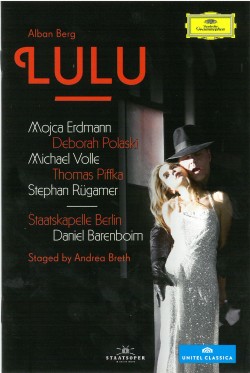 Berg – Lulu
Berg – Lulu
Mojca Erdmann; Deborah Polaski; Michael Volle; Thomas Piffka; Stephan Rugamer; Staatskapelle Berlin; Daniel Barenboim
Deutsche Grammophon 0440073 4934
After Alban Berg’s death in 1935, his great opera Lulu remained incomplete – until Friedrich Cerha orchestrated the final act in 1979. For this production from the Berlin Staatsoper in 2012, a new version of all three acts has been created. Berg’s sardonic Prologue has been replaced by an actor lying on the floor reciting Kierkegaard. Instead of Berg’s precisely described silent movie, we now see Lulu’s blinking eyes projected on the windshield of one of the cars that litter the stage. The first scene of Act III has been cut altogether.
What remains of the third act has been newly orchestrated by David Robert Coleman, using noticeably leaner textures than Berg and Cerha and some non-Bergian instruments like steel drums and marimba. His completion doesn’t fit in, but it brings out Berg’s expressionist lines.
Director Andrea Breth’s staging fails to reveal how exciting the plot of Lulu is. The single set – with wrecked cars piled up on one side, and what appear to be cages or prison bars erected on the other – is relentlessly grim, especially when watched through camerawork so close that we rarely see the whole stage.
Breth’s Lulu is a victim, as affectless as a puppet. But the Lulu created by Berg and playwright Frank Wedekind is an amoral, willful seductress. Mojca Erdmann makes a lovely, alluring Lulu, but can’t convey the spine-tingling danger that the great Lulus, from Evelyn Lear and Teresa Stratas to Christine Schäfer and Barbara Hannigan, present. Michael Volle makes a powerful Dr. Schön and Jack the Ripper and Deborah Polaski is moving as the doomed Countess. But the most enthralling moments come from Daniel Barenboim’s amazing Staatskapelle orchestra.



